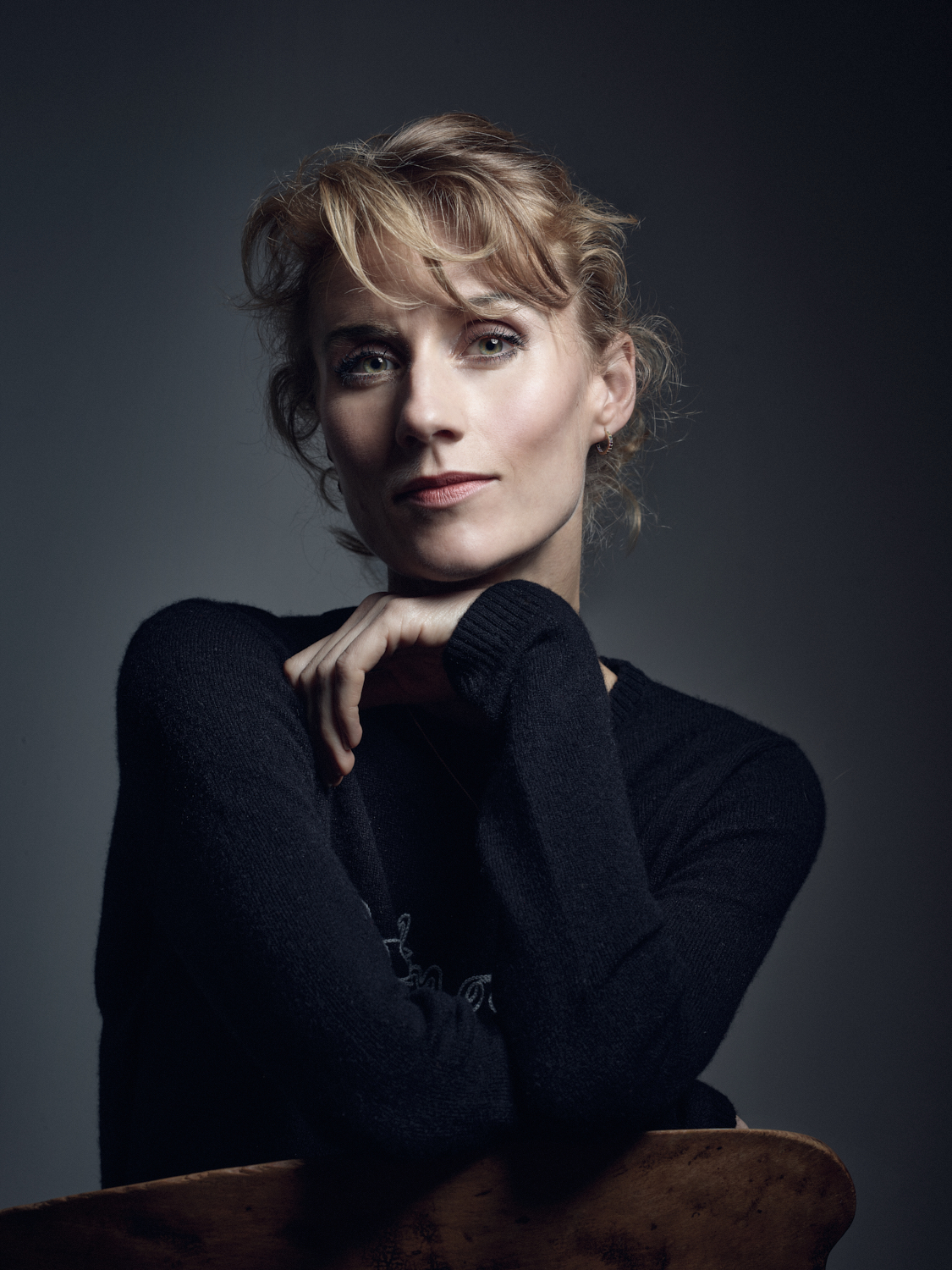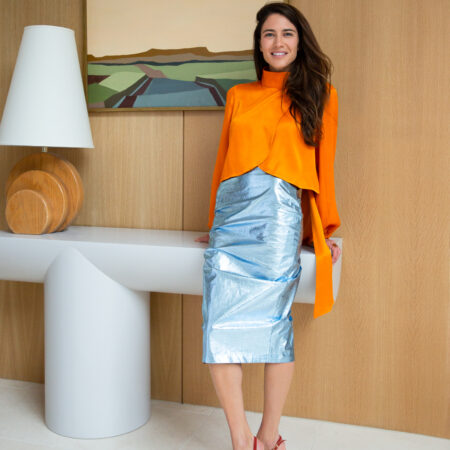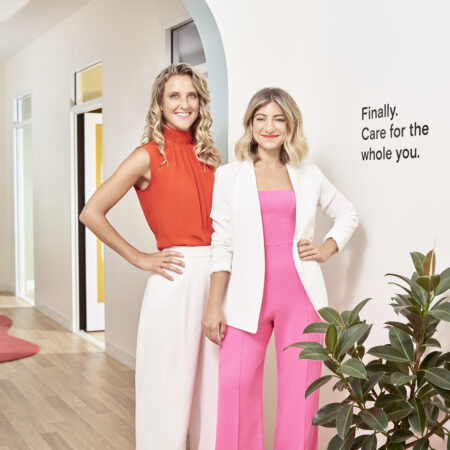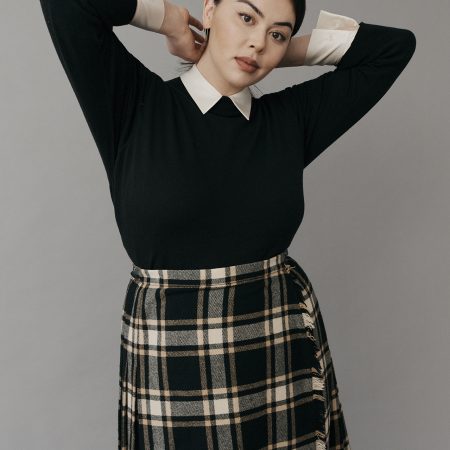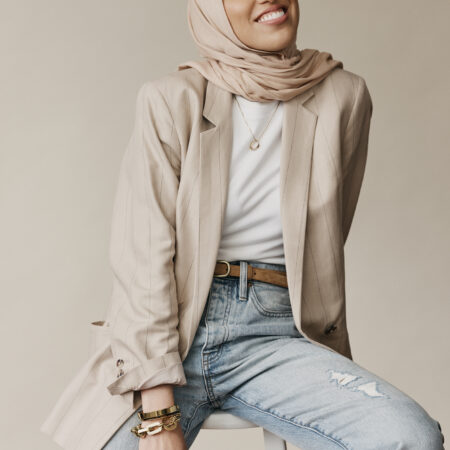“One of the transformative powers of cinema is to be able to suggest that there might be more than what we see in our everyday lives,” explains Jessica Swale, the director and screenwriter of Summerland, a new World War II drama that depicts a mixed-race, lesbian love story which, due to the time period, wasn’t able to flourish. The film, premiering on July 31, follows Alice (Gemma Arterton), a cynical folklore investigator who reluctantly opens her home and heart to a World War II evacuee (Lucas Bond) after years of living in isolation following the estrangement from the love of her life (Gugu Mbatha-Raw). While the story is in many ways melancholic, Swale hopes that people will feel a little bit more optimistic and hopeful than before they watched the film. “I want people to believe that if you are kind and openhearted, and if you believe in yourself, it’s possible your life can be a little bit better than it would’ve otherwise been,” she says.
The fact that Summerland’s protagonist is a strong-willed woman is hardly surprising. Swale’s first play, Blue Stockings, was the first work by a female playwright ever performed at Shakespeare’s Globe. (The play, which she wrote and directed, refers to a derogatory term for female intellectuals and chronicles the experiences of England’s first female university students in the 1890s.) Eight years later in 2018, Swale directed Leading Lady Parts, a short film critiquing the casting process in the film industry, inspired by the Time’s Up movement and featuring several A-list actresses. Now, as Swale gears up to release her first feature film, she’s already committed to implementing a much-needed change—both in front of and behind the camera. Here, she opens up about what she’s doing to make Hollywood more just for all women (not just the privileged and well-connected) and why she’s hopeful that COVID-19 will change the storytelling narrative for good.
Considering the industry’s massive funding gap (in 2016, female-directed films in Europe received just 16 percent of funding), were there any challenges in getting Summerland made?
When I started writing the script roughly five years ago, Gemma Arterton was playing the lead in Nell Gwynn, which was a play of mine that was showing on the West End. She had received the script to Summerland by a producer and loved it, but once she was attached, we didn’t really have anybody else on the team. We were going through a feminist moment and decided the two of us should do it ourselves. We, as women, always have to wait for other people to give us permission, so we were like, “let’s just go and make this happen.” [Arterton] took it to Guy Heeley, the producer that she was working with at the time on The Escape, and he joined right away.
The next part was trickier; trying to find funding and work out what scale the film should be. As a first time filmmaker, all of the awards and funds that are available for first-timers are for low-budget films (meaning, under a million pounds) because people don’t expect a first time filmmaker to make a film that makes five times as much. There actually was an indie-version of the film that we could have made with a smaller budget, but it would have been too compromising to the story so we all agreed that we needed to try and find a funding team who would deliver a much more substantial budget—and who would have to trust me even though they hadn’t seen a film I’d made before. Ultimately, BFI came on board, followed by Alliance and Embankment, and after that, we had our main team and started filming in the fall of 2018.

Of the top 200 films released in 2019, women represented just 15.1 percent of directors, 17.4 percent of writers, and 18 percent of studio heads. Do you think the industry is becoming more equal?
I do think things are changing, and I actually think the conversation has changed quite quickly. At first, it was about women and community, and now the conversation has become much more specific and interrogative. Women’s experiences differ enormously depending on their privilege and their background so we’re starting to see that while there is a big push in film to support women more, there’s also an important push to support all women. The privileges that you used to have because of your class, your background, or the fact that you had wealthy parents, are now being challenged. What we’re trying to do is to make sure that women from all economic backgrounds get an opportunity, and that race and disability is addressed to make greater parity across the industry. But it’s also important to note that while the awareness is changing, structurally, it also takes time to train people.
We’ve also reached a point as a society where we no longer put on a pedestal the people we have done for a long time—the white, privileged, middle-class man who tends to still run most of the world. There was a time when those people were front and center of every film, but our appetite for that has waned and this crisis has shown that the heroes in our society aren’t the privileged politicians, they are actually often the villains who have failed a lot of people. The real heroes are the nurses, the supermarket workers, and the people delivering food to families. I think—and hope—that future film will reflect that.
How are you, as a filmmaker, taking responsibility for implementing this change?
I’m very focused on having as many women involved in the film as possible and creating a diverse team. But I did find that in some areas you have to really search to find people, particularly for this film, in terms of racial diversity, because we were filming on the south coast which is quite a white area of England. It’s important that we get in at the grassroots level and make sure there are opportunities and encouragement for people to get involved in film at a much earlier level. It takes the economy to support those people, and it takes opportunities, and it takes time. Right now with COVID-19, the film industry is going to be struggling and we have to really be aware that at this moment where suddenly people are desperate to get anything made, we don’t cut corners and do it the easy way, which is to go to the people we already know and who are already established. We need to use this as an opportunity to look at the industry and to try and encourage more people to gain experience in order to jump in.
Women’s experiences differ enormously depending on their privilege and their background—there’s also an important push to support all women.
I think lockdown has encouraged people to test their artistic skills—people are making short films on their iPhones, or they’re writing when they’ve never done that before—and hopefully, people will have more confidence in themselves in pursuing things they may not have thought of as a career option before. But it’s our responsibility as people who are already in the industry to seek those individuals out and I make it my mission always to involve quite a few people on every project who are new to the industry. I actually made a short film called Leading Lady Parts right before making Summerland and 98 percent of our cast and crew were women. It was a really tough task, but we made it, so I know it’s possible.
This was your first time writing a film after years of working as a playwright. How was it different?
It was an unusual process for me because I usually start from something cultural or personal that intrigues me, like reading something in the newspaper or coming across somebody’s history, but with this, there was nothing. I wrote it while I was on a bursary at BAFTA and the boundaries of the bursary said that you had to start from scratch and you weren’t allowed to work on something that you already had in your drawer, which was terrifying yet terribly exciting. There’s a liberation of being allowed to write anything you want, but when you have the choice of absolutely anything that could ever exist in the entire universe, and you don’t even have a genre, it’s a pretty wide spec.
But one of my favorite things about film is the fact that there are phases for writers and directors. In theater, that’s a much less common phenomenon because there are fewer people involved in the creative process. As a screenwriter, you have all forms of communication at your disposal. For example, the way you write action is quite different from the way you write stage directions because you can talk about how a character is feeling in a film script, whereas in the play script you’re kind of expected to allow the words to do that; it’s not really conventional to write that into the stage directions. So for me, as somebody who enjoys thinking as much of action and visual as I do about dialogue, film seemed the perfect eventual home for me, and writing and directing allows me to tell a story from its very earliest channel. I think it’s a heavenly job to have, and it’s an immense privilege to be able to do it.
How do you balance making a film that your audience wants to see versus one you want to make?
I don’t ever think about the audience. I always tell the stories I find important and that I’m intrigued by. If you start trying to factor in any sort of commercial notion of what film other people might like, then you’re in trouble. The only way that we’ll have any original voices is if people trust their own instincts and write from their own hearts.
What advice do you have for women who want to make it in your industry?
Persevere. We keep getting knocked back, and it will happen repeatedly, so you have to be a little bit tough. You should trust your own beliefs and not try and be like anybody else; what the film industry needs is originality.
Women are also often encouraged to be polite and apologetic and not step forward and have faith in themselves and what they have to say. But we have to challenge that in ourselves. Personally, I’m trying to call myself out for beginning a sentence with “sorry,” which I do too much. Men are much better at this than women, but when you’re walking into a room and you need four million quid from some funding body, and you tell them, “I’ve never made a film before and I’m not sure I really have the experience to do it,” they’re not going to give you a penny. But if you walk in and you say, “this might be my first film but this is my experience and this is my passion and let me persuade you,” then you’re going to get somewhere. We’re so trained to do the opposite of that as women so we need to up our game if we’re ever going to be 50-50 in our industry.
Summerland premiers on July 31 and will be available on VOD.
